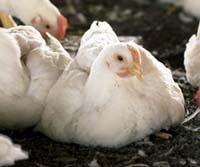to Develop Avian Flu
Vaccine

|
|
Researchers hope to develop
effective vaccines against the avian flu, which broke out on two
Delaware farms in 2004.
(Photo
courtesy of the USDA) |
By Jacqueline Ruttimann
Capital News Service
Wednesday, Sept. 28, 2005
WASHINGTON - Gaithersburg-based MedImmune Inc. will join forces with the
National Institute of Allergy and Infectious Diseases in developing a series
of vaccines against the avian flu virus, Health and Human Services Secretary
Mike Leavitt announced Wednesday.
"The threat of pandemic flu is an urgent health challenge," Leavitt said
on The Diane Rehm Show on WAMU. "This agreement will help speed the process
of developing vaccines we will need to fight an outbreak if the avian flu
starts to spread rapidly through the human population."
MedImmune, one of the nation's four vaccination providers for the common
flu, will use its nasal spray vaccine FluMist in the vaccine creation
process.
NIAID and MedImmune plan to develop at least one vaccine for each of the
16 variations of a surface protein -- known as hemagglutinin -- found on the
avian flu virus, including the one for the H5N1 virus that is spreading
throughout Asia, Kazakhstan and Russia and that scientists fear may develop
into a pandemic.
The H5N1 strain of the avian flu virus, found in wild migratory birds
throughout Southeast Asia and parts of Russia, has infected and killed
numerous species, including domestic poultry, pigs and, sporadically,
people. According to a Sept. 22, 2005, World Health Organization report
there have been 115 confirmed human cases of avian flu and 59 deaths.
Although the virus still is transmitted from animal to animal and animal
to human, worldwide health officials, such as Centers for Disease Control
and Prevention Director Dr. Julie L. Gerberding, say that it is "highly
likely" that the virus will mutate into a form that can spread from human to
human. That change in transmission could cause a worldwide pandemic.
The combination of the avian flu virus with a human influenza virus was
the cause of two previous worldwide pandemics, the Asian Flu in 1957 and the
Hong Kong Flu in 1968, both of which spread worldwide within one year of
being detected, according to the CDC Web site.
CDC modeling studies estimate that in the absence of any control measures
such as vaccines or antiviral drugs, a "medium-level" U.S. pandemic would
affect 15 to 35 percent of the population, cause 89,000 to 207,000 deaths
and 314,000 and 734,000 hospitalizations.
On the same program, Leavitt said a pandemic could spread much like a
forest fire, and stressed that vigilance is necessary for worldwide health
officials to curb its onset.
"If we see it when it's just a spark we can put it out," said Leavitt,
indicating that preventive measures such as quarantines and vaccines would
be employed. He also said a "substantial investment" would be needed in
terms of expanding the production capabilities of vaccine manufacturers,
ensuring worldwide collaboration, creating tools that would accurately and
quickly predict the first U.S. avian flu case and purchasing a national
stockpile of drugs.
The strategic national stockpile currently has enough Tamiflu, the only
antiviral effectively shown to treat influenza viral strains similar to the
avian flu, Gerberding said to Congress in May, to cover 8.3 percent of the
total U.S. population. There is enough of another antiviral, rimantadine, to
cover about 17 percent of the population, however influenza viruses quickly
obtaining resistance to it.
Collaboration between public and private health institutions that
manufacture vaccines is a step in the right direction, said Dr. James
Campbell, principle investigator at the University of Maryland School of
Medicine Center for Vaccine Development. Campbell is testing one of three
NIAID-sponsored human clinical trials. He is using a vaccine derived from
the injectable vaccine Fluzone from Sanofi Pasteur.
"I think it's a great idea," said Campbell. "It's a hope that we will
have multiple companies and multiple institutions working toward a pandemic
vaccine."
